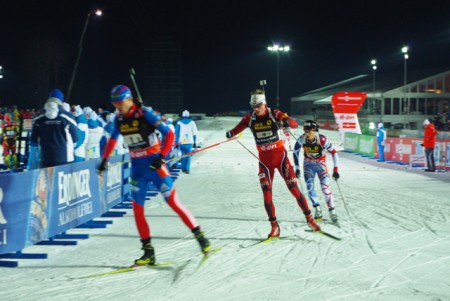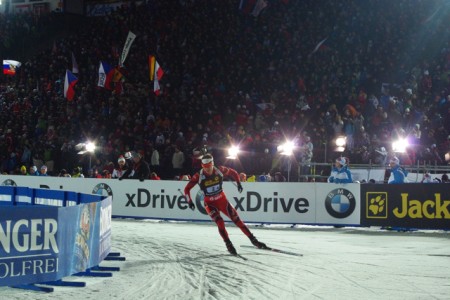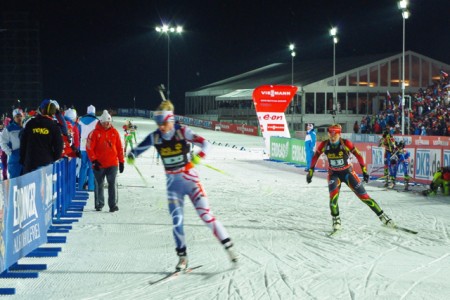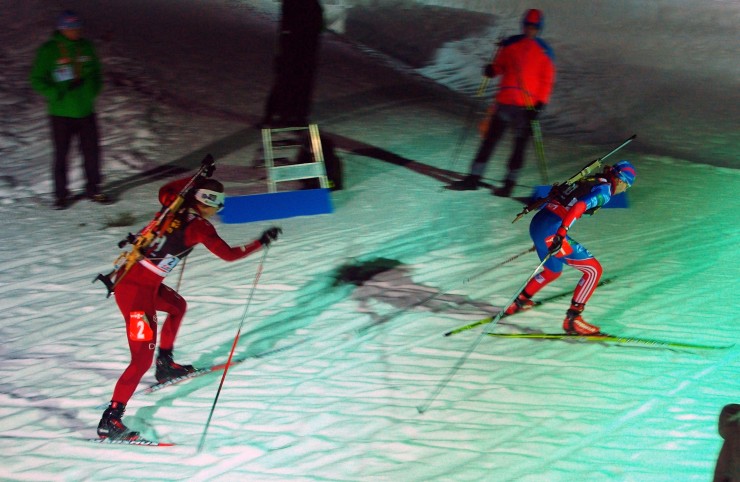
NOVÉ MĚSTO NA MORAVĚ, Czech Republic – For Norway, today’s World Championship title in the mixed relay was like a walk in the park, a simple repeat of last year’s victory.
Except, if anything, the 2013 edition was more straightforward: there were no malfunctioning targets, no win that came despite crossing the finish line second behind Slovenia. No hiccups of any kind. Instead, Norway led nearly from start to finish, and earned a 20-second victory over the French.
World Cup overall leader Tora Berger kicked things off with a typically flawless leg, cleaning her targets with no spare rounds and then skiing away from the competition on the final loop for a 12-second lead. Synnøve Solemdal was the only team member who put the win in jeopardy, but it was just barely: she used two spare rounds in standing and tagged off 3.7 seconds down on Olga Vilukhina of Russia.
From there, the Norwegian men took over, starting with Tarjei Bø. He quickly caught Russia’s Anton Shipulin – Alexis Boeuf of France did too – and the lead pack cruised easily on the first lap.

Bø, the 2011 World Cup champion, had so far had a rough season that didn’t even start on time thanks to health problems over the summer, but he didn’t so much as flinch on the trails and looked to have regained his ability to dominate.
“It was the first race this season that I feel like myself, so it was good,” Bø said after using a single spare round in the whole race. “I had some power on the uphills, and this is my strength. In January it was my weakness.”
He handed Emil Hegle Svendsen a 12-second lead over Russia, with France a bit further back. Russian anchor Dmitry Malyshko has had a breakout season, but perhaps the pressure of anchoring at World Championships got to him, and he uncharacteristically blew it on his prone stage. After using all three spare rounds – losing valuable seconds in the meantime – he still had to ski a penalty loop.
From that point Russia was out of the race, but their loss was a gain for France, which moved into second. Svendsen had to use a spare round in standing, at which point French anchor Martin Fourcade was on the range, but it was not enough to make much of a dent in his lead.
In the postrace press conference, a French journalist asked Svendsen how he felt in that final stage, undoubtedly hoping to hear that the Norwegian had to focus hard to overcome his nerves as Fourcade stalked into the range, ready to pounce.

But Svendsen is a big-race veteran, knows that he can respect his competitors without fearing them. No such response was going to come out of his mouth.
“I was pretty confident,” he said. “My first five shots were quite good and I knew that I would hit the last one, so there was not so much stress… It’s always a big relief that you have the gold medal in the pocket. It was a fantastic feeling for sure.”
Fourcade congratulated Svendsen, and said that he gave it his best, but the 30-second gap he started with was too much to close on the quick-skiing Norwegian.
“I knew after the shooting that it would be really hard to catch him,” Fourcade said. “I tried at the beginning of the lap, but then he got a bit too much of an advantage. It was really good race – I think it is a good advertisement for biathlon and an exciting way to have the beginning of the World Championships.”
While the win was exciting for Norway, what really electrified the sold-out 27,000-strong crowd here in Vysočina Arena was the Czech team. Every time a Czech was on the shooting range, the stadium would explode with noise for each hit and miss. Every time a Czech skier came on the video screen, the crowd would erupt again.
The bronze medal was not exactly surprising – the team has been strong all year, with Ondřej Moravec earning two podiums and Gabriela Soukalova three, including her first win. Still, though, it was not expected to see the home team on the podium instead of the Russians or the Germans, who struggled with shooting and finished a dismal 13th.
“The bronze medal is a pleasure for us,” Soukalova said in broken English in the press conference, visibly overcome with emotion.
Veronika Vitkova started things off with two spare rounds in prone, and tagged off 44 seconds out of the lead. Not exactly an auspicious start when a team wants to win a medal.
“I know I made two mistakes on the first shooting, but at the end everything came together and it came out pretty well,” Vitkova said through a translator.

Soukalova used a single spare before Jaroslav Soukup jumped up a few more places with one spare of his own. It was particularly good to see after the Czech racer, who earned individual bronze at last year’s World Championships, was in a horrific bike accident this summer that left him with multiple serious injuries on several parts of his body. His return for this Championships hadn’t been guaranteed, and when he said earlier this season that he hoped to be a medal contender, it seemed like a long shot.
But aside from shooting well, Soukup had the fifth-fastest time among third-leg skiers.
“After the accident was really hard for me,” Soukup said in the press conference. “I wasn’t thinking about biathlon. But now I feel like a normal person. I feel good and I can actually do biathlon.”
That left things to Moravec, who capitalized on Malyshko’s shooting woes and moved into third as the Russian worked his way through spare rounds. Unlike Malyshko, Moravec was flawless on the range; he knocked down all ten targets and was especially impressive in standing, where he cleaned quickly and earned the guarantee of bronze.
“It was such an amazing feeling,” Moravec said in the press conference of the final lap. “For us it’s like being a winner – a gold medal winner. We’re so happy. And at home in Nove Mesto, too.”
The surprises did not stop there, as Italy placed fourth, a definite surprise; Slovenia, last year’s runners-up, were fifth and Russia limped in for sixth. The United States placed eighth and Canada 15th; stay tuned for more from those teams.

Chelsea Little
Chelsea Little is FasterSkier's Editor-At-Large. A former racer at Ford Sayre, Dartmouth College and the Craftsbury Green Racing Project, she is a PhD candidate in aquatic ecology in the @Altermatt_lab at Eawag, the Swiss Federal Institute of Aquatic Science and Technology in Zurich, Switzerland. You can follow her on twitter @ChelskiLittle.



